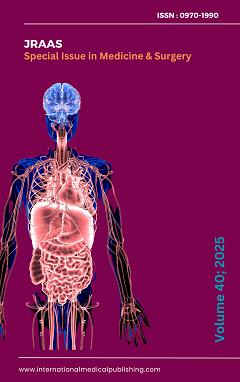A Study of Complications in Chronic Kidney Disease Patients on Haemodialysis at a Tertiary Care Centre
DOI:
https://doi.org/10.71393/htz6h257Keywords:
Chronic kidney disease Hemodialysis Vascular access Cardiovascular morbidityAbstract
Introduction: Chronic Kidney Disease (CKD) is a progressive condition frequently culminating in end-stage renal disease (ESRD), where hemodialysis serves as a life sustaining therapy. However, dialysis is associated with a broad spectrum of complications that adversely affect patient morbidity, quality of life, and treatment outcomes. This study aimed to assess the prevalence and patterns of dialysis-related complications and their correlation with sociodemographic and clinical factors among CKD patients at a tertiary care center. Material and Methods: A hospital based cross-sectional study was conducted in the Department of Medicine over two years (July 2023–June 2025). Ninety-five adult patients undergoing maintenance hemodialysis were included using purposive sampling. Data were collected on demographic details, comorbidities, laboratory findings, and dialysis-related complications. Complications were categorized into patient-related, technical, and vascular access-related groups. Statistical analysis explored associations between complications and clinical variables. Results: The majority of patients were aged 51–70 years (55.79%) with a slight male predominance (53.68%). Hypertension (41.05%) and diabetes mellitus (34.74%) were the most common comorbidities. Cardiovascular complications were the most frequent patient-related events (71.58%), followed by central nervous system manifestations (28.42%). Technical complications included dialyzer reactions (26.32%) and bleeding diathesis (22.11%), while vascular access-related complications comprised steal syndrome (51.58%), central venous thrombosis (18.95%), and cardiac arrest (14.74%). No statistically significant associations were observed between complications and age, gender, dialysis duration, BMI, personal history, or comorbidities, indicating multifactorial etiologies. Conclusion: Complications in hemodialysis patients are diverse, with cardiovascular, technical, and vascular access issues significantly contributing to morbidity. The absence of strong associations with clinical and demographic factors highlights the complexity of risk determinants. Early nephrology referral, individualized dialysis protocols, and multidisciplinary management are essential to mitigate these complications and improve patient outcomes.


